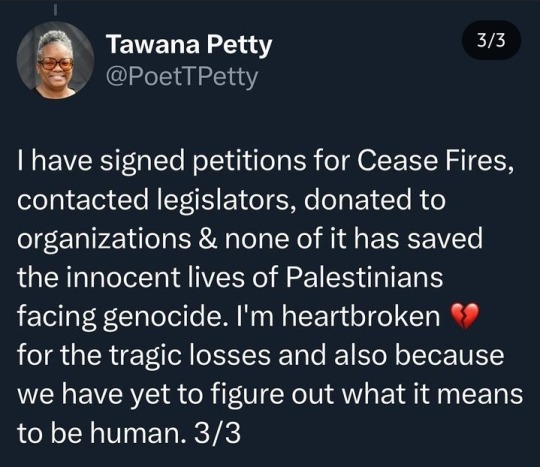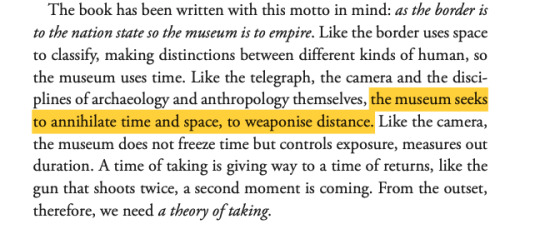alison cornell . www.projectionismcollective.com . poet & tour guide . cat enthusiast . i keep trying to stop watching so much TV but so far it's been a fool's errand
Don't wanna be here? Send us removal request.
Text
Maybe in a year I could write something. There is something in me maybe someday to be written; now it is folded, and folded, and folded, like a note in school.
Sharon Olds, from "September 2001: New York City" (Stags Leap)
153 notes
·
View notes
Text
“I am astonished in my teaching to find how many poets are nearly blind to the physical world. They have ideas, memories, and feelings, but when they write their poems they often see them as similes. To break this habit, I have my students keep a journal in which they must write, very briefly, six things they have seen each day—not beautiful or remarkable things, just things. This seemingly simple task usually is hard for them. At the beginning, they typically “see” things in one of three ways: artistically, deliberately, or not at all. Those who see artistically instantly decorate their descriptions, turning them into something poetic: the winter trees immediately become “old men with snow on their shoulders,” or the lake looks like a “giant eye.” The ones who see deliberately go on and on describing a brass lamp by the bed with painful exactness. And the ones who see only what is forced on their attention: the grandmother in a bikini riding on a skateboard, or a bloody car wreck. But with practice, they begin to see carelessly and learn a kind of active passivity until after a month nearly all of them have learned to be available to seeing—and the physical world pours in. Their journals fill up with lovely things like, “the mirror with nothing reflected in it.” This way of seeing is important, even vital to the poet, since it is crucial that a poet see when she or he is not looking—just as she must write when she is not writing. To write just because the poet wants to write is natural, but to learn to see is a blessing. The art of finding in poetry is the art of marrying the sacred to the world, the invisible to the human.”
— Linda Gregg, from “The Art of Finding”
5K notes
·
View notes
Text
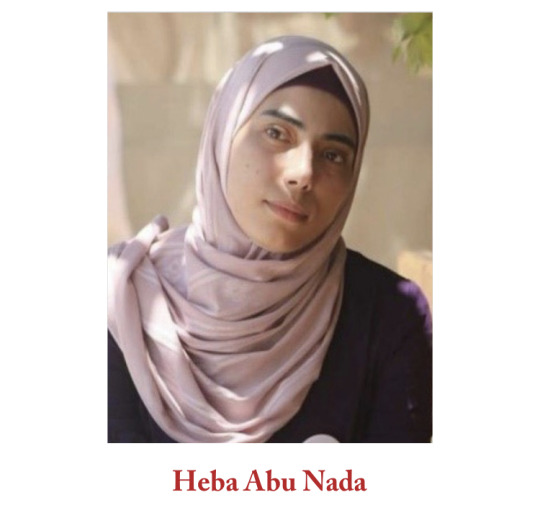

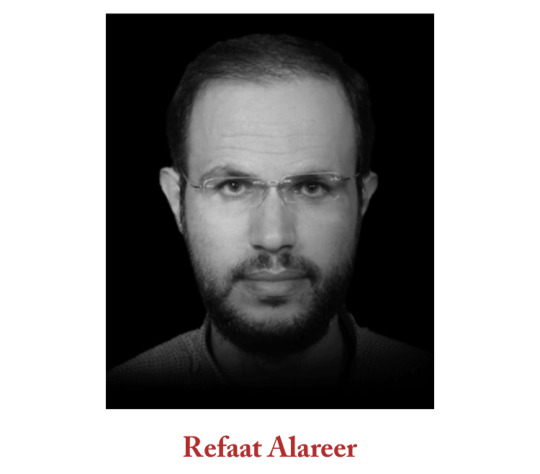






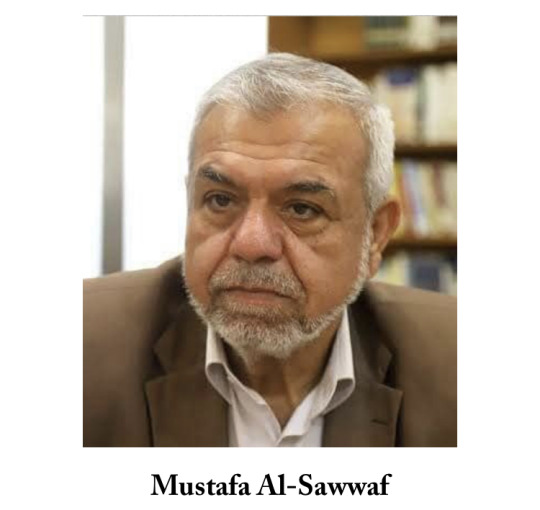




[Text ID: “It shall pass, I keep hoping. It shall pass, I keep saying. Sometimes I mean it. Sometimes I don’t. And as Gaza keeps gasping for life, we struggle for it to pass, we have no choice but to fight back and to tell her stories. For Palestine.”]
10K notes
·
View notes
Text
Dr Refaat AlAreer was just murdered by israel (12/7/23)
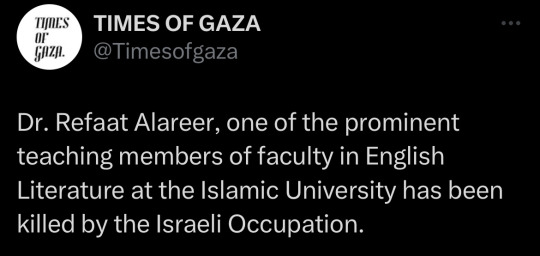
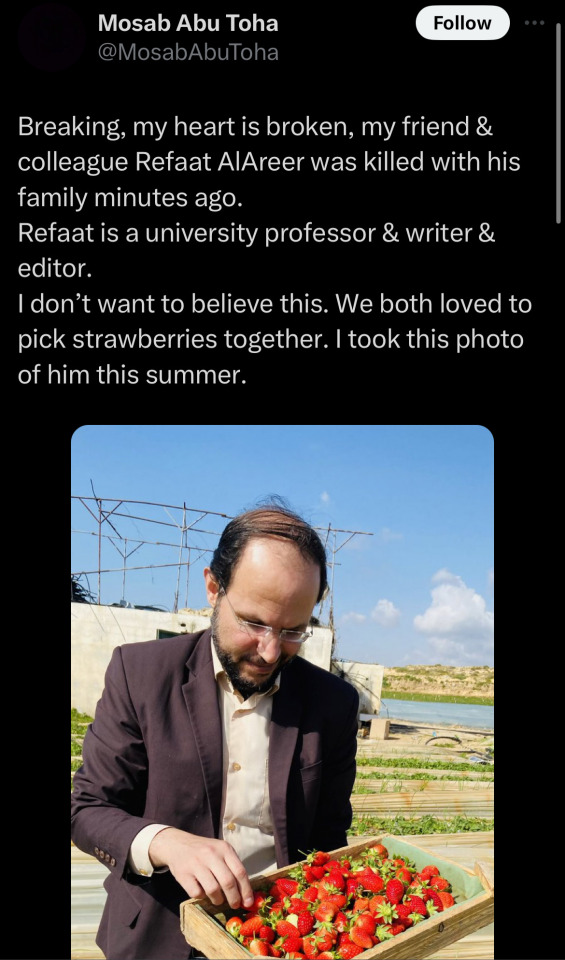
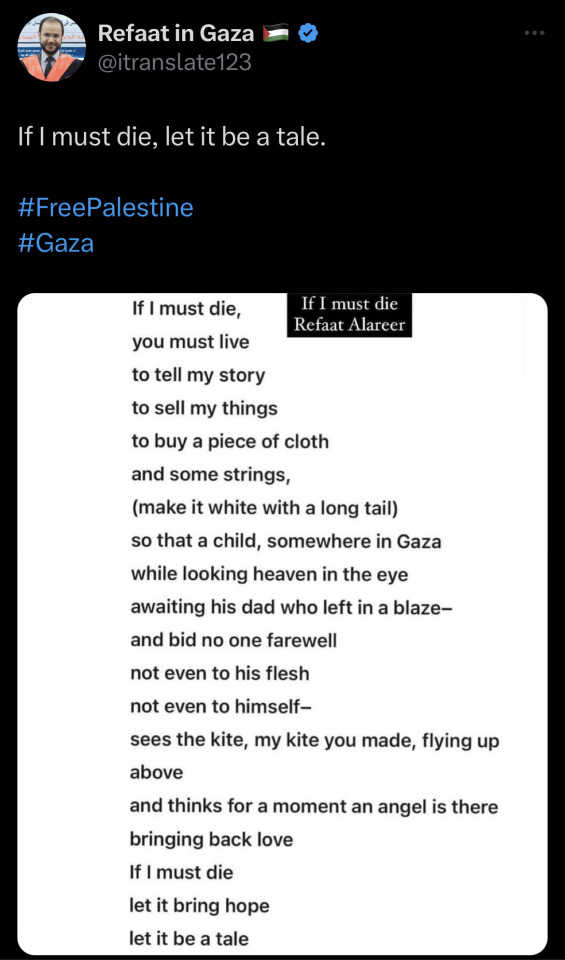
His last tweet:

19K notes
·
View notes
Text
Years ago, I received a query from a prominent editor about a line in Mahmoud Darwish’s long poem, “The ‘Red Indian’s’ Penultimate Speech to the White Man,” (If I Were Another). The poem channels Chief Seattle’s voice and spirit. In the poem’s second section, the line in question follows an address to Columbus, “the free [who] has the right to find India in any sea, / and the right to name our ghosts as pepper or Indian.”
The line in question is this: “You have burst seventy million hearts…enough, / enough for you to return from our death as monarch of the new time”:
isn’t it time we met, stranger, as two strangers of one time and one land, the way strangers meet by a chasm? We have what is ours…and we have what is yours of sky. You have what is yours…and what is ours of air and water.
“I just don’t get where he got the seventy million from?” the editor asked.
I didn’t reply. I didn’t wonder about the accuracy of Darwish’s claim. Maybe he included all the Natives annihilated in the Americas over the centuries. The only thought I had in my head was, “Is this really what’s bothering you about the poem?”
Years later, in a daydream, a marginalia of my soul visited me, and it spoke thus: “Do you remember those seventy million punctured hearts in Darwish’s poem? If you’re ever asked again, if the person who asks you says that historical studies show the number is not possible or whatever, remember the buffalos.”
The buffalo hearts are also native hearts. Who will count the donkeys, dogs, and cats in Gaza? The birds will return.
— Fady Joudah, in his essay “A Palestinian Meditation in a Time of Annihilation”
2K notes
·
View notes
Text
if you are a fan of the poem "what resembles the grave but isn't," you might be interested to know that the poet, anne boyer, resigned her position at the new york times magazine today, and her letter is worth reading in its entirety.
24K notes
·
View notes
Text
I've posted a couple entries before but as it's ongoing, I wanted to link the Gaza Diary project from the Guardian. A person named Ziad is recounting day by day how the family/neighbors are living through the siege in Gaza. It is not pulling any punches, but it's the sort of thing people mean when they say "Don't look away".
It's really helpful as the death toll mounts to be able to look at stuff like this—it's a fact that no matter how much sympathy one has, sheer numbers of dead get too big for people not in the midst of it to be able to process. The goal here is to put faces and voices back.
This person is incredibly brave and dedicated, and I pray they all stay as safe as they can.
(@tributary asked to be tagged in this, here you are)
2K notes
·
View notes
Text
“At the trial of God, we will ask: why did you allow all this? / And the answer will be an echo: why did you allow all this?”
— Ilya Kaminsky, from “A City Like a Guillotine Shivers on Its Way to the Neck,” Deaf Republic
58K notes
·
View notes
Text

Today I touched what bones are made of, The B'K Vol 12 Issue 4
4 notes
·
View notes
Photo

“I remind myself that language isn’t my job. Writing a poem isn’t my job. My job is the human job of waiting and listening, and language is just what poets use—like wind chimes—to catch the sound of the larger, more essential thing. Wind chimes themselves are not the point. The point is the wind.”
—Jenny George, in “Wilder Forms: Our Fourteenth Annual Look at Debut Poets” in the January/February issue of Poets & Writers Magazine (2019); read the rest at pw.org!
2K notes
·
View notes
Text
protesters in Atlanta just got hit with $700k bail for two people who were arrested at the night of rage for Tortuguita. if you guys could donate to the Atlanta Solidarity Fund and spread the word that they need funds, that would be really helpful to the local scene, including the forest defenders who are still mourning their murdered comrade.
https://atlsolidarity.org/
5K notes
·
View notes
Text
every single day i think about how horribly rumi’s poems have been translated from persian into english & how they’ve been turned from gorgeous poems abt islamic spirituality into these… pithy vapid little quotes that white people post as instagram captions. white scholars & translators straight-up falsified and misrepresented the essential themes of and islamic mysticism inherent to his work in favor of turning it into easy-to-consume love poetry & it never fails to make me angry
43K notes
·
View notes


